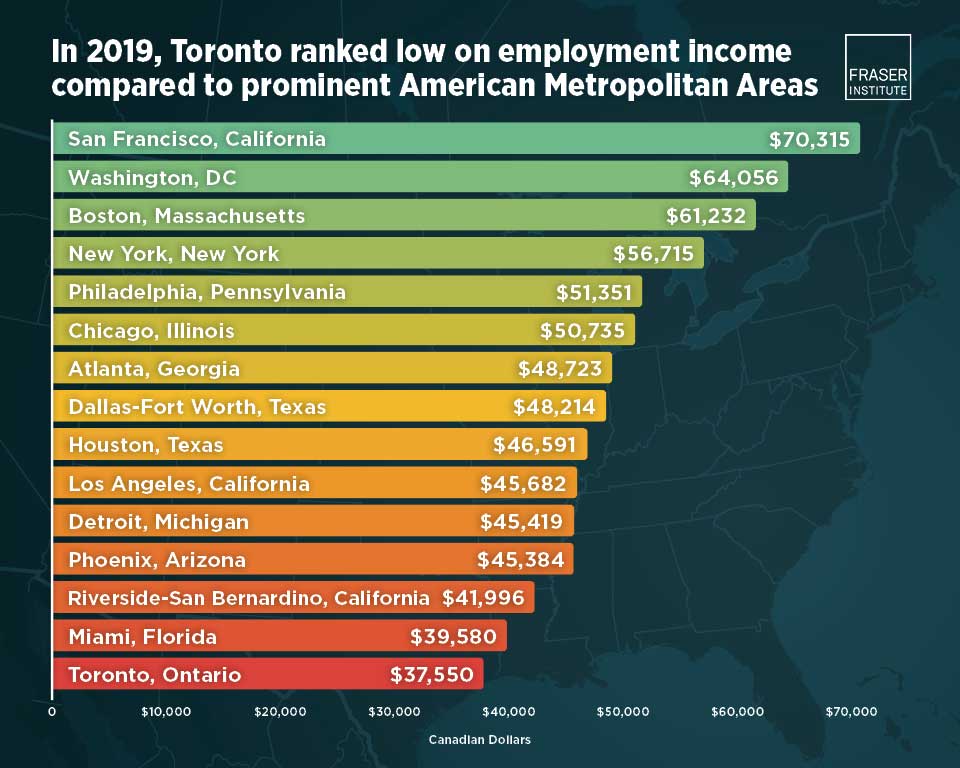Study
| EST. READ TIME 1 MIN.Toronto has the lowest level of median employment income amongst the 15 largest metropolitan areas in Canada and the United States
Comparing Employment Income in Toronto and Selected American Metropolitan Areas
- Several recent Fraser Institute studies have found that a “prosperity gap” exists between Ontario and nearby American states. Additional research has shown that the province experienced weak economic growth throughout the 2010s.
- This paper turns to an examination of the labour market performance of Ontario and Canada’s largest CMA, the metropolis of Toronto. Specifically, we examine median employment income in the 15 largest metropolitan areas in Canada and the United States (CMAs) United States (MSAs) in 2019. Toronto is the only Canadian metropolitan area large enough to qualify for this list.
- We find that Toronto has the lowest level of median employment income amongst the 15 largest metropolitan areas in Canada and the United States. The gap between Toronto and the lowest ranking US MSA, Miami, was $2,030 in 2019. The gap was larger for all other US MSAs analyzed here.
- This study also measures growth in median employment earnings during the 2010s. On this indicator, Toronto also fared poorly. Toronto’s annual median employment income growth rate of 0.4 per cent ranked 10th out of the 15 metropolitan areas.

Share
-

Ben Eisen
Senior Fellow, Fraser InstituteBen Eisen is a Senior Fellow in Fiscal and Provincial Prosperity Studies and former Director of Provincial Prosperity Studies at theFraser Institute. He holds a BA from the University of Toronto and an MPP from the University of Toronto’s School of Public Policy and Governance. Prior to joining the Fraser Institute Mr. Eisen was the Director of Research and Programmes at the Atlantic Institute for Market Studies in Halifax. He also worked for the Citizens Budget Commission in New York City, and in Winnipeg as the Assistant Research Director for the Frontier Centre for Public Policy. Mr. Eisen has published influential studies on several policy topics, including intergovernmental relations, public finance, and higher education policy. He has been widely quoted in major newspapers including the National Post, Chronicle Herald, Winnipeg Free Press and Calgary Herald.… Read more Read Less… -

Joel Emes
Senior Economist, Fraser InstituteJoel Emes is a Senior Economist, Addington Centre for Measurement, at the Fraser Institute. Joel started his career with theFraser Institute and rejoined after a stint as a senior analyst, acting executive director and then senior advisor to British Columbia’s provincial government. Joel initiated and led several flagship projects in the areas of tax freedom and government performance, spending, debt, and unfunded liabilities. He supports many projects at the Institute in areas such as investment, equalization, school performance and fiscal policy. Joel holds a B.A. and an M.A. in economics from Simon Fraser University.… Read more Read Less… -

Nathaniel Li
Senior Economist, Fraser InstituteNathaniel Li is a Senior Economist at the Fraser Institute. He holds a B.A. from the Fudan University in China anda Ph.D. in Food, Agricultural and Resource Economics from the University of Guelph. Prior to joining the Fraser Institute, he worked for the University of Toronto as a postdoctoral fellow and the University of Guelph as a research associate. His past research work has been published in many high-quality, peer-reviewed academic journals, including the Applied Economic Perspectives and Policy, Agricultural Economics, Preventive Medicine, and Canadian Public Policy. His current research covers a wide range of issues in fiscal, education, and labour-market policies.… Read more Read Less…
Related Topics
Related Articles
Santa Claus model of tax policy doesn’t work
By: Ben Eisen and Jake Fuss
Government job-growth rate in Canada vastly outstrips private sector
By: Ben Eisen and Milagros Palacios
Ford’s mini-budget keeps Wynne fiscal legacy intact
By: Ben Eisen and Jake Fuss
Wages and salaries lower in Alberta than every U.S. state
By: Tegan Hill and Alex Whalen